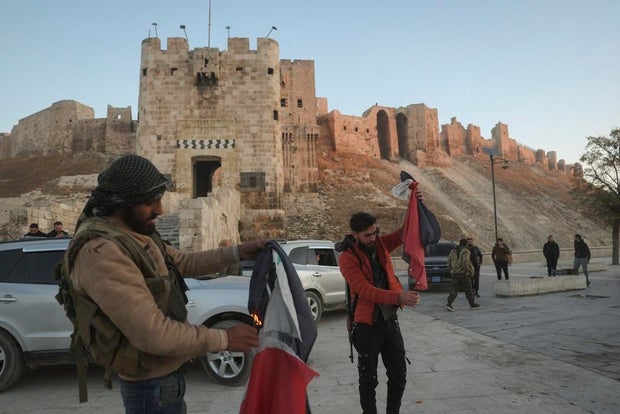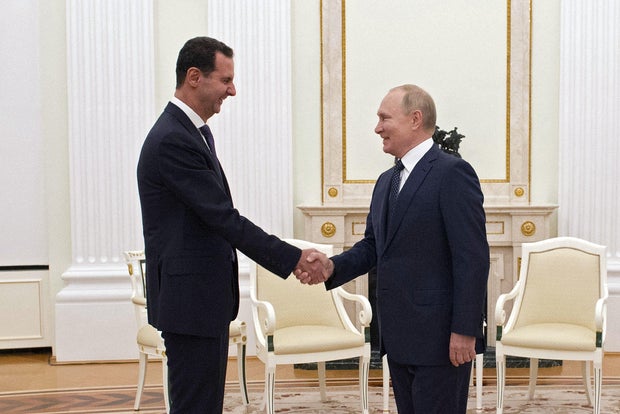The Syrian army and its Russian ally carried out deadly joint air raids on areas that Islamist-led rebels took control of during the weekend. These strikes were a response to a lightning offensive carried out by the rebels which allowed them to regain control of entire swaths of northwest Syria from government forces.
The conflict that began more than a decade ago took a significant turn a few days ago, taking many people by surprise – including, reportedly, Syrian dictator Bashar Assad and his Russian backers. On Saturday, rebels, including many members of the US-designated Islamic terrorist group Hayat Tahrir Al-Sham (HTS), took control of the major city of Aleppo in northern Syria.
Rebels seized Aleppo’s airport on Sunday and began pushing into towns and villages in the countryside around the city after leaving piles of dead government soldiers in the streets. Observers said rebel forces often faced little or no resistance from regime forces, but on Monday the pace of the surprise offensive appeared to have slowed, with Assad and his Russian backers stepping up their response.
Surprise offensive by Syrian rebels
Syria’s civil war began in 2011 after civilians led pro-democracy protests against Assad, and his government responded by opening fire on its own people. The ensuing war reportedly left around 500,000 dead, but in recent years it has descended into a stalemate. Government forces control the west and south of the country, US-backed rebels dominate the northeast, and Islamist rebel factions – including those now in control of Aleppo – hold most of the northwest.
“We are coming to Damascus,” the rebels chanted on Sunday, threatening to continue their journey towards the Syrian national capital and the stronghold of the Assad government.
Ghaith Alsayed/AP
The stalemate balance began to shift last week, when the Islamist-led rebel alliance in the northwest launched its offensive. Over the weekend, HTS and allied factions took control of the city of Aleppo for the first time since the start of the civil war more than a decade ago, according to the director of the Syrian Observatory of human rights, Rami Abdel Rahman.
Aleppo, an ancient city dominated by its iconic citadel, is home to two million inhabitants. It was the scene of violent fighting at the start of the conflict but, until Sunday, the rebels had never managed to completely capture it. Video shows rebels in military fatigues patrolling the streets of Aleppo, some setting fire to a Syrian flag and others waving the green, red, black and white flag of the revolution.
While the streets appeared mostly empty, some residents came out to encourage the rebel fighters’ advance. HTS is an alliance led by the former Syrian branch of Al-Qaeda. It fights alongside allied factions, with units receiving orders from a joint command.
Aron Lund of the Century International think tank said: “Aleppo appears to be lost to the regime.”
He added: “And a government without Aleppo is not really a functioning government in Syria. »
The United States and its allies France, Germany and Britain called on Sunday for “de-escalation” in Syria and the protection of civilians and infrastructure. The United States maintains hundreds of troops in northeast Syria as part of an anti-jihadist coalition and has also continued to carry out strikes against Islamist groups in the country.
Russia and Iran pledge to help Assad in Syria
Assad’s response to the surprise offensive was building further Monday with joint airstrikes by his air force and Russian allies, and expanded ground operations aimed at retaking towns and villages north of Aleppo that would be in progress.
ABDULAZIZ KETAZ/AFP/Getty
Syrian-Russian air raids hit several areas of Aleppo and neighboring Idlib provinces, killing at least 49 people, including 17 civilians, according to the Observatory.
“The strikes targeted… displaced families living near an internally displaced person camp,” said Hussein Ahmed Khudur, a 45-year-old teacher who sought refuge in an Idlib camp after fleeing fighting in Idlib province. Aleppo. He said one of the five people killed in a strike was one of his students and the other four were his four sisters.
Russia, which first intervened directly in the war in Syria in 2015, said Monday that he continued to support Assad.
MIKHAIL KLIMENTYEV/SPUTNIK/AFP/Getty
“We of course continue to support Bashar al-Assad and we continue contacts at the appropriate levels, we analyze the situation,” Kremlin spokesman Dmitry Peskov told reporters.
Iran’s top diplomat, Abbas Araghchi, was in Syria on Sunday to deliver a message of support, state media said.
On Monday, Iranian Foreign Ministry spokesman Esmail Baqaei said the Islamic Republic entered Syria at the official invitation of Assad’s government.
“Our military advisors were present in Syria, and they still are. The presence of advisers from the Islamic Republic of Iran in Syria is not a new thing,” he said.
Same Syrian civil war, but at very different times
Although the fighting is rooted in a war that began more than a decade ago, much has changed since then. Millions of Syrians have been displaced, and around 5.5 million live in neighboring countries.
Most of those involved in the early anti-Assad protests are either dead, in exile, or in prison.
Russia, meanwhile, is approaching the third year of its incredibly expensive project. full-scale war against Ukraineand Iran’s militant allies Hezbollah and Hamas have been massively weakened by more than a year of conflict with Israel.
On Monday, Iran’s Foreign Ministry said it would maintain military support for the Syrian government.
But the role of Lebanese Hezbollah, which has played a key role in supporting the government, particularly around Aleppo, remains in question, especially after it withdrew from several of its positions to focus on fighting against Israel.
HTS and its allies launched their offensive on Wednesday, just as a the ceasefire came into force in Lebanon after more than a year of war between Hezbollah and Israel.
Recent violence in Syria has killed some 244 rebels and 141 fighters from the Syrian regime and its allies, as well as at least 24 civilians, according to the OSDH, which has a network of sources in Syria. The Observatory said rebel advances met little resistance.
Aaron Stein, president of the US-based Foreign Policy Research Institute, said Russia’s “presence has been significantly reduced and rapid-response airstrikes are of limited utility.”
He called the rebel advance “a reminder of the weakness of the (Assad) regime.”
Sunday’s airstrikes on parts of Aleppo were the first since 2016.
And
contributed to this report.


